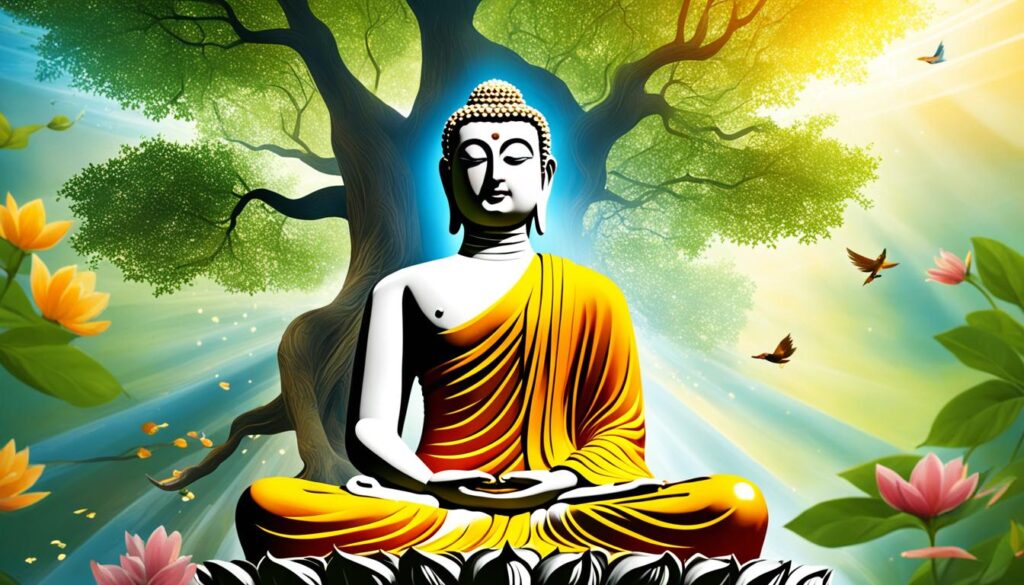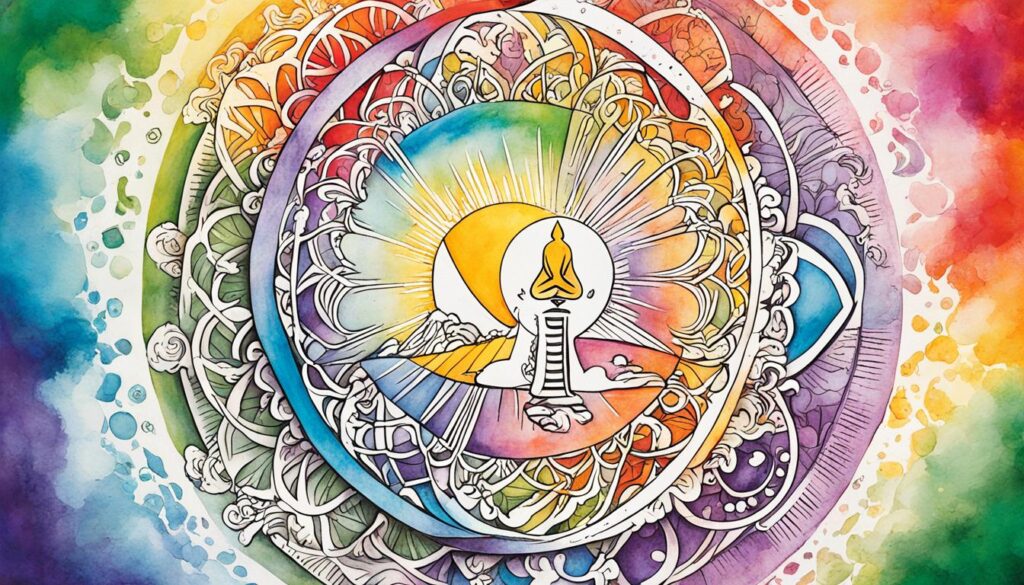“Do not dwell in the past, do not dream of the future, concentrate the mind on the present moment.” – Buddha
Buddhism, with its profound wisdom and teachings, has captivated the hearts and minds of countless individuals throughout history. This ancient religion, founded by Siddhartha Gautama, who became known as the Buddha, offers profound insights into the nature of existence, human suffering, and the pursuit of true happiness.
At its core, Buddhism is not just a religion; it is a way of life—a philosophy that encourages mindfulness, compassion, and personal growth. It provides a roadmap to navigate the complexities of modern life and find inner peace and contentment.
Key Takeaways:
- Buddhism is a major global religion that dates back to the 6th and 5th centuries BCE.
- The core teachings of Buddhism revolve around the Four Noble Truths, which address the presence, cause, and end of suffering.
- Buddhism emphasizes the pursuit of Nirvana, a state free from suffering and the cycle of birth and rebirth.
- Karma plays a crucial role in Buddhism, with actions in one life influencing future lives.
- Meditation and mindfulness are key practices in Buddhism, leading to greater self-awareness and inner peace.
Siddhartha Gautama: The Buddha
In the 6th century BCE, Siddhartha Gautama, born into a wealthy royal family, lived a life of opulence and privilege. However, his sheltered existence was profoundly transformed when he encountered the harsh realities of old age, sickness, and death. Deeply moved by the suffering he witnessed, Siddhartha renounced his luxurious life and set out on a spiritual quest to uncover the truth of existence and the means to alleviate human suffering.
For years, Siddhartha immersed himself in intense meditation and self-reflection, seeking enlightenment. Finally, under the Bodhi tree, he attained a profound realization and became the Buddha, meaning the “Enlightened One.” The Buddha had unlocked the keys to understanding the causes of human suffering and the path to liberation from it.
Following his awakening, the Buddha dedicated the rest of his life to spreading his teachings and guiding others on the path to enlightenment. His profound insights and principles became the foundation of Buddhism, a religion and philosophy that continues to inspire millions around the world to this day.

Key Teachings of the Buddha
The teachings of the Buddha are centered around addressing the fundamental nature of suffering and the means to transcend it. Through his teachings, the Buddha offered a comprehensive understanding of human existence, providing individuals with practical guidance for personal and spiritual growth.
| Concept | Description |
|---|---|
| The Four Noble Truths | The Buddha’s foundational teachings, unveiling the existence of suffering, its origin, its cessation, and the path to end suffering. |
| The Noble Eightfold Path | A path of ethical conduct, mental development, and wisdom, offering a comprehensive framework for leading a skillful and enlightened life. |
| Karma | The law of cause and effect, emphasizing that our intentions and actions shape our future experiences and the cycle of rebirth. |
| Nirvana | The ultimate goal of Buddhist practice, representing the cessation of suffering and liberation from the cycle of birth and death. |
The Four Noble Truths
The Four Noble Truths are the foundation of Buddhist teachings, offering profound insights into the nature of suffering and the path to liberation. These truths, revealed by the Buddha, provide a framework for understanding the human condition and the pursuit of lasting happiness.
1. The Existence of Suffering
Suffering is an intrinsic part of the human experience. It encompasses both physical pain and the pervasive dissatisfaction that arises from our desires and attachments. Whether it is the pain of illness or the anguish of unfulfilled desires, suffering is an undeniable reality in our lives.
2. The Cause of Suffering
The cause of suffering can be attributed to two fundamental factors: desire and ignorance. Our insatiable desire for pleasure, material possessions, and immortality leads to attachment and craving, which in turn perpetuates suffering. Ignorance refers to our inability to see the world as it truly is, clouded by delusions and misconceptions.
3. The End of Suffering
Despite the existence and cause of suffering, the Buddha offered hope by proclaiming that suffering can be ended. This liberation from suffering is known as Nirvana, a state of ultimate peace and enlightenment. Nirvana transcends the cycle of birth and rebirth, freeing individuals from the perpetual cycle of suffering.
4. The Path to End Suffering
To achieve the end of suffering and attain Nirvana, the Buddha outlined the Noble Eightfold Path. This path consists of eight interconnected principles and practices that guide individuals towards liberation. They include right understanding, right thought, right speech, right action, right livelihood, right effort, right mindfulness, and right concentration.
The Noble Eightfold Path serves as a roadmap for personal transformation, leading individuals towards a life of wisdom, ethical conduct, and mental cultivation. By following this path, one can gradually overcome suffering and realize the full potential of human existence.

| Noble Truth | Description |
|---|---|
| 1 | The recognition of suffering |
| 2 | The cause of suffering: desire and ignorance |
| 3 | The end of suffering: Nirvana |
| 4 | The path to end suffering: Noble Eightfold Path |
Karma and the Cycle of Rebirth
Karma, a foundational concept in Buddhism, centers around the understanding that our actions in this lifetime have repercussions in future lives. Good deeds, such as acts of generosity and the practice of meditation, create positive karma and lead to happiness and well-being. On the other hand, harmful actions like lying and killing generate negative karma and result in unhappiness and suffering. The weight of karma is influenced by various factors, including the frequency and intention behind our actions.
In Buddhism, it is believed that individuals can be reborn into different realms as part of the cycle of rebirth. These realms include the realm of demigods, gods, humans, animals, ghosts, and hell. Each realm is characterized by its own set of experiences and challenges. However, it is the human realm that holds particular significance in Buddhism. This realm is considered the highest as it provides individuals with the opportunity for spiritual growth and enlightenment.
The Six Realms of Rebirth
| Realm | Description |
|---|---|
| Realm of Demigods | Characterized by temporary pleasures and a constant striving for power and status. |
| Realm of Gods | Associated with celestial beings who experience immense pleasure, but are still subject to the cycle of birth and rebirth. |
| Human Realm | Considered the most fortunate realm as it provides opportunities for personal growth, spiritual advancement, and liberation from suffering. |
| Realm of Animals | Marked by instinctual behavior and a lack of cognitive abilities, animals are subject to the conditions and limitations of their existence. |
| Realm of Ghosts | Inhabitants of this realm experience intense suffering, isolation, and constant craving. |
| Realm of Hell | Associated with intense pain, suffering, and torment. |
Understanding the concept of karma and the cycle of rebirth provides insight into the interconnectedness of our actions and their consequences. By cultivating positive karma through ethical conduct and wholesome intentions, individuals can aspire to be reborn into more fortunate realms, ultimately progressing towards liberation from the cycle of birth and rebirth.

The Path to Happiness: Meditation and Mindfulness
Meditation and mindfulness are essential practices in Buddhism that can lead to happiness, peace of mind, and personal transformation. By cultivating these practices, you can discover a deep sense of inner peace and develop a greater understanding of yourself and the world around you.
Meditation is a powerful tool for training the mind to be fully present in the present moment. It involves focusing your attention and letting go of attachments and distractions. This practice allows you to develop insight, concentration, and awareness, enabling you to see things more clearly and deeply.
Mindfulness, a key aspect of meditation, involves paying non-judgmental attention to your thoughts, feelings, and sensations. It encourages you to fully experience the present moment without getting caught up in worries about the past or future. By practicing mindfulness, you can cultivate a sense of equanimity, acceptance, and inner peace.
When you engage in meditation and mindfulness, you embark on a journey of mental cultivation. It is a process of cultivating qualities such as focus, clarity, and compassion. Through regular practice, you can develop a more balanced mind, free from excessive worries, anxieties, and distractions.
The cultivation of right concentration is a central aspect of meditation and mindfulness practice. Right concentration refers to the ability to sustain focused attention on a chosen object, such as the breath or a mantra. It leads to deeper states of peace, tranquility, and insight.
By integrating meditation and mindfulness into your daily life, you can experience numerous benefits. These practices can help reduce stress, increase self-awareness, improve mental clarity, and enhance emotional well-being. They allow you to cultivate a calmer, more compassionate mind and develop a greater sense of connection to yourself and others.
Take the time to engage in regular meditation and mindfulness practices. Set aside a quiet space where you can sit in a comfortable position and focus on your breath or a chosen object. Start with short periods and gradually increase the duration as you become more comfortable. With consistency and patience, you will embark on a path of self-discovery, personal growth, and a deeper understanding of the world.

Conclusion
Buddhism offers a transformative philosophy and a path to personal and societal harmony. Its teachings on mindfulness, compassion, and the end of suffering provide profound insights that are applicable to addressing modern challenges and finding fulfillment in life.
Through the practice of meditation and mindfulness, individuals can cultivate greater self-awareness, emotional well-being, and inner growth. These practices allow you to develop a deep understanding of your thoughts and emotions, enabling you to navigate life with clarity and equanimity.
Furthermore, Buddhism encourages the cultivation of wisdom and compassion, not only for your own happiness but also for the well-being of others. By incorporating Buddhist principles into your life, you can promote personal growth and contribute to societal harmony.
By embracing Buddhism’s philosophy and implementing its practices, you can find meaning, purpose, and peace in your life. Whether you seek spiritual fulfillment or simply aspire to lead a more balanced and contented existence, Buddhism provides valuable teachings that support your journey of personal development.
FAQ
What is Buddhism religion?
Buddhism is a major global religion that originated in the 6th and 5th centuries BCE. It is based on the teachings of Siddhartha Gautama, also known as the Buddha, who renounced his princely title to seek truth and enlightenment.
What are the beliefs of Buddhism?
Buddhism’s core teachings are based on the Four Noble Truths, which address the existence, cause, and end of suffering, as well as the Noble Eightfold Path, which outlines the principles and practices for achieving liberation from suffering.
What is the history of Buddhism?
Buddhism dates back to the 6th and 5th centuries BCE and was founded by Siddhartha Gautama, the Buddha. After attaining enlightenment, the Buddha spent the rest of his life teaching others about his insights and principles.
What are the Buddhist teachings?
The teachings of Buddhism revolve around the Four Noble Truths, which address suffering, its cause, its end, and the path to end suffering. Buddhism also emphasizes mindfulness, compassion, and the pursuit of Nirvana, a state free from suffering and the cycle of rebirth.
What are the practices of Buddhism?
Buddhism places a strong emphasis on meditation and mindfulness as tools for achieving happiness and peace of mind. Through meditation, individuals can develop insight, concentration, and awareness, while mindfulness involves paying attention to one’s thoughts, feelings, and sensations without judgment.
What is the philosophy of Buddhism?
Buddhism’s philosophy revolves around the pursuit of personal and societal harmony. It teaches individuals to cultivate wisdom and compassion for their own happiness and the well-being of others. Buddhism provides insights into addressing modern challenges and finding meaning and peace in life.

